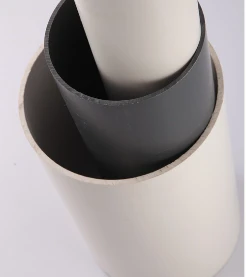Dec . 26, 2024 08:28 Back to list
HDPE Water Pipes for Efficient Water Supply Systems and Sustainable Infrastructure Solutions
Understanding HDPE Water Pipes Benefits, Applications, and Considerations
High-Density Polyethylene (HDPE) pipes have gained significant popularity in various industries due to their unique properties and advantages, particularly in water distribution systems. This article explores the characteristics of HDPE water pipes, their applications, benefits, and factors to consider when choosing them for water-related projects.
What is HDPE?
High-Density Polyethylene (HDPE) is a thermoplastic polymer made from the monomerethylene. Known for its high strength-to-density ratio, HDPE is utilized in various applications, ranging from packaging to pipes. When it comes to water pipes, HDPE offers exceptional durability, flexibility, and resistance to environmental stress, making it a preferred choice for water distribution systems.
Advantages of HDPE Water Pipes
1. Durability and Longevity HDPE pipes boast a long service life, often exceeding 50 years when properly installed and maintained. They are resistant to corrosion, abrasion, and many chemicals, minimizing the risk of leaks and failures over time.
2. Flexible and Lightweight Unlike traditional materials such as concrete or metal, HDPE is lightweight and flexible. This flexibility allows for easier transportation and installation, especially in challenging terrains. It can bend without breaking, which is particularly beneficial in areas with shifting soils.
3. Resistance to Weather and Environmental Conditions HDPE pipes can maintain their integrity under extreme temperatures, whether they are exposed to high heat or freezing conditions. They are also resistant to UV radiation, reducing the risk of degradation when installed above ground.
4. Cost-Effectiveness Although the initial cost of HDPE pipes may be slightly higher than alternatives, their long lifespan, reduced maintenance costs, and lower installation expenses often lead to overall cost savings. The ease of installation can significantly reduce labor costs.
5. Environmentally Friendly HDPE is a recyclable material, contributing to a more sustainable construction approach. Additionally, the low energy consumption in producing HDPE pipes compared to traditional materials further enhances their environmental appeal.
Applications of HDPE Water Pipes
HDPE water pipes are widely used across various applications, including
hdpe water pipe

- Municipal Water Supply HDPE pipes are extensively used in municipal water supply systems due to their reliability and longevity. They are ideal for transporting potable water over long distances.
- Irrigation Systems In agriculture, HDPE pipes are employed in irrigation systems, ensuring efficient water distribution to crops and minimizing waste.
- Industrial Applications Many industries use HDPE pipes for transporting water and other liquids. Their resistance to various chemicals makes them ideal for industrial applications.
- Sewer and Drainage Systems HDPE's strength and flexibility make it suitable for sewer and drainage applications, allowing for effective management of wastewater.
Considerations When Choosing HDPE Water Pipes
When selecting HDPE pipes for water applications, several factors should be taken into account
- Pipe Size and Pressure Rating The size of the pipe and its pressure rating must correspond to the requirements of the specific project. Proper sizing ensures efficient flow while accommodating pressure demands.
- Installation Conditions The ground conditions, climate, and application environment can influence the installation method and performance of HDPE pipes. Understanding these factors is crucial for achieving optimal results.
- Regulatory Compliance Ensure that the HDPE pipes comply with local regulations and standards for water quality and environmental safety. It is essential that the pipes are certified for potable water use if the application requires it.
Conclusion
HDPE water pipes represent a significant advancement in piping technology, offering numerous advantages over traditional materials. Their durability, flexibility, and cost-effectiveness make them an ideal choice for a wide range of applications, from municipal water supply systems to agricultural irrigation. As the demand for sustainable and reliable water distribution systems continues to grow, the use of HDPE pipes is expected to increase, making them a vital component in the advancement of infrastructure development. By considering the various factors involved in their selection and installation, stakeholders can ensure the successful implementation of HDPE water pipe systems that meet current and future needs.
-
Premium PP Welding Rod: GPT-4 Turbo Enhanced
NewsAug.01,2025
-
HDPE Drainage & Irrigation Pipe - Durable, Efficient Solutions
NewsAug.01,2025
-
Premium PVC Transparent Pipe: Durable & Clear Solutions
NewsJul.31,2025
-
High-Quality UPVC Electrical Pipe for Safe Wiring Solutions
NewsJul.30,2025
-
Premium PVC Pipe Fitting Supplier – Durable & Leak-Proof Solutions
NewsJul.30,2025
-
High-Gloss PVC Rigid Sheet for Durable & Smooth Surfaces | Wholesale Supply
NewsJul.29,2025

